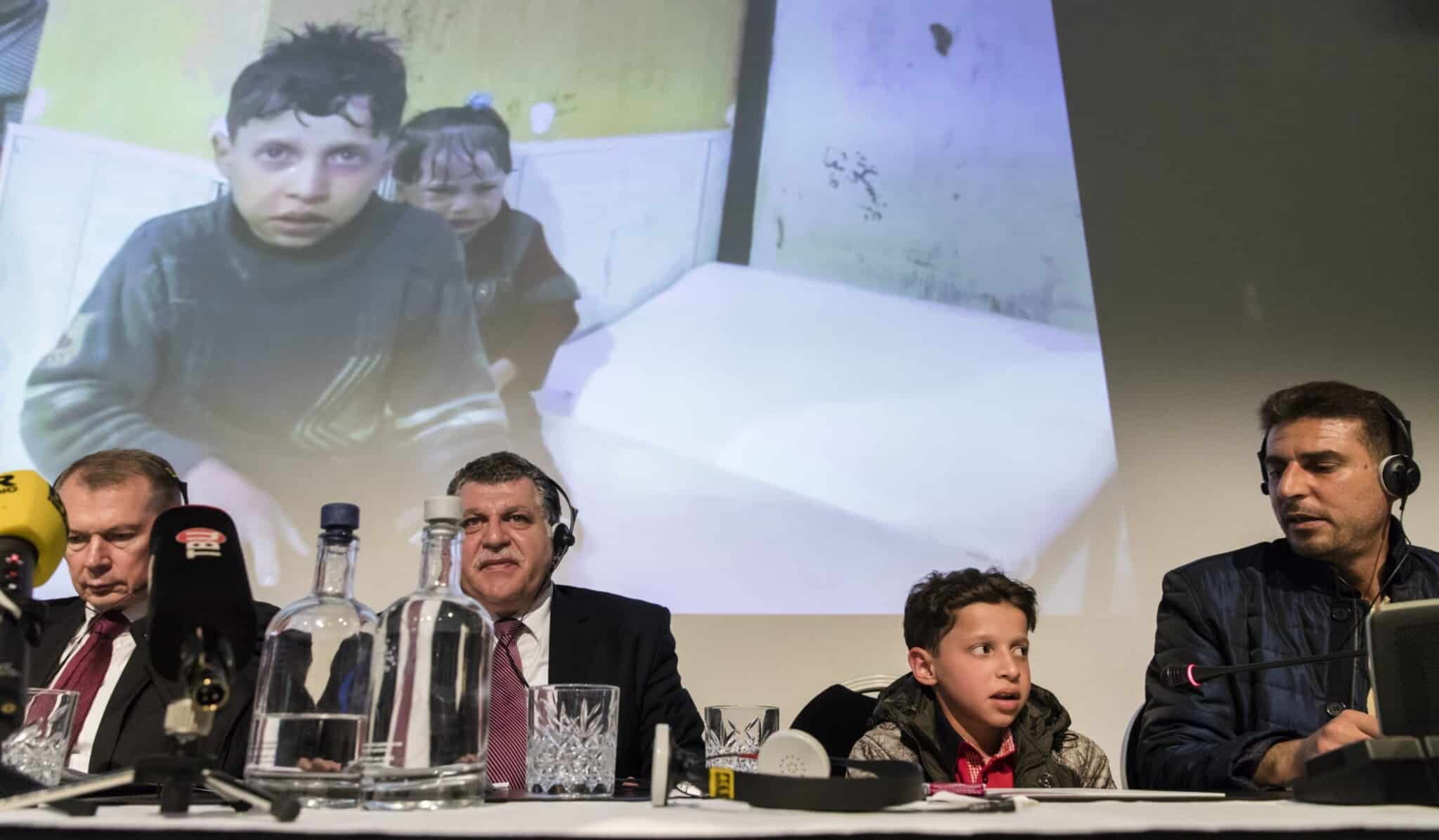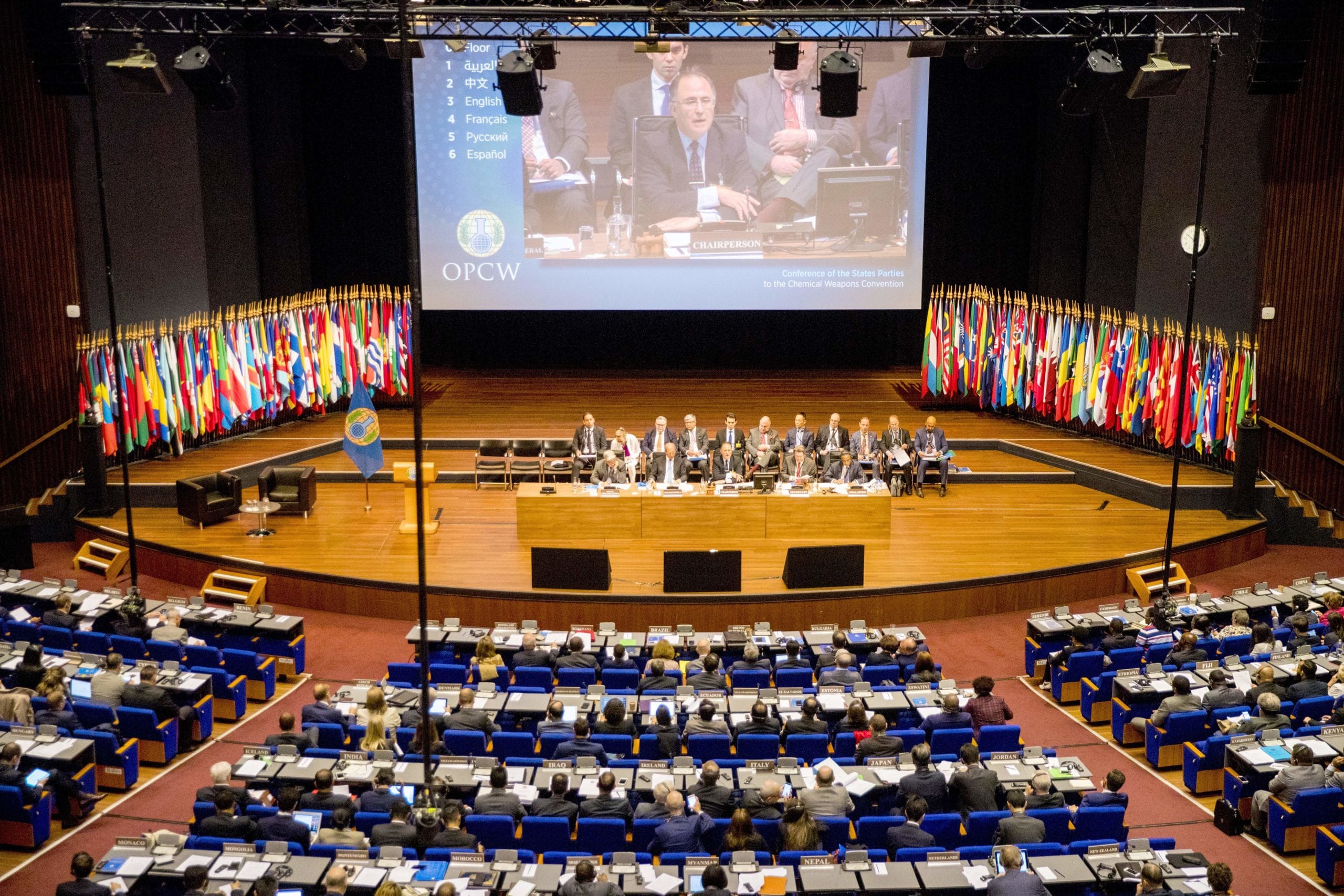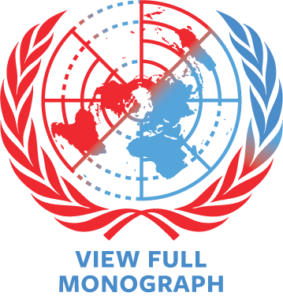June 30, 2021 | International Organizations Monograph
Organization for the Prohibition of Chemical Weapons
June 30, 2021 | International Organizations Monograph
Organization for the Prohibition of Chemical Weapons
Introduction
In 1993, multilateral negotiations resulted in the Convention on the Prohibition of the Development, Production, Stockpiling and Use of Chemical Weapons, or Chemical Weapons Convention (CWC). The CWC entered into force in 1997, establishing the convention’s monitoring and implementation body, the Organization for the Prohibition of Chemical Weapons (OPCW). The CWC and OPCW currently have 193 members.1
The CWC and OPCW aim to achieve the worldwide elimination of chemical weapons. A state party to the CWC commits never to “develop, produce, otherwise acquire, stockpile or retain chemical weapons” and to declare and destroy existing chemical weapons stocks and production facilities.2 CWC parties must also declare annually their stocks and locations of sensitive chemicals and precursors listed in the CWC’s control annex. States’ commitments and activities are subject to OPCW monitoring, reporting, and on-site verification.
The OPCW, headquartered in The Hague, Netherlands, has three main bodies: the Executive Council (EC), consisting of 41 elected member states; the all-member Conference of States Parties (CSP); and the Technical Secretariat, which carries out CWC implementation and verification activities. In 2017, the EC elected Director-General Fernando Arias to a four-year term. The United States contributes nearly $28 million annually to the OPCW, or about 22 percent of the organization’s budget.3
Problems
The OPCW and CWC have recently come under strain due to Russia’s and Syria’s uses of chemical weapons in violation of international norms and laws. Russia, a CWC signatory and OPCW member state, has used the organization to shield itself and its client regime in Damascus from accountability for their uses of chemical weapons. The CWC has few enforcement mechanisms, and some member states have been unwilling to challenge Moscow.4
In 2013, the regime of Syrian dictator Bashar al-Assad began using chemical weapons against civilians during the country’s civil war. The regime briefly paused its chemical weapons attacks following a Russian-brokered agreement under which Damascus joined the OPCW in September 2013, thus enabling verification of the dismantling, destruction, or removal of Syria’s declared chemical weapons and production capabilities. An OPCW-UN Joint Mission stated in June 2014 that the verification of the destruction of Syria’s declared stockpile was complete.5
However, Damascus did not declare all its capabilities and stockpiles, and the OPCW later determined that Assad resumed using chemical weapons in April 2014. A July 2020 EC decision required Syria to fully declare its programs by October 2020 and to demonstrate compliance with the CWC.6 The OPCW director-general reiterated in February 2021 that Damascus had failed to do so.7 In April 2021, the CSP voted to restrict Syria’s rights and privileges at the OPCW – including its voting rights – until Damascus meets its CWC obligations.8
Russia has consistently questioned the validity of the OPCW’s technical conclusions on Syria and has encumbered the organization’s investigation of Moscow’s March 2018 Novichok attack in Salisbury, England, against former Russian double agent Sergei Skripal.9 Moscow even attempted to hack the OPCW headquarters in 2018.10

Russian (left) and Syrian (center-left) diplomats hold a press conference in The Hague on April 26, 2018, called by the Russian Embassy to present “witnesses” (right, center-right) purportedly “used to stage” videos depicting Assad regime chemical weapons attacks in Douma. (Photo by Bart Maat/AFP via Getty Images)
In an effort to placate U.S. and British concerns and obfuscate its role in the Salisbury attack, Russia participated in a November 2019 consensus vote in which, for the first time in CWC history, the CSP successfully moved to amend the CWC’s Schedule 1 control list to include some Novichok-family substances.11 However, this did not stop Moscow from using Novichok again in an August 2020 attack against Russian dissident Alexei Navalny.12 Moscow denied involvement despite clear evidence that Russia’s Federal Security Service was to blame.13
Since 2017, Moscow has also pressured some states to vote against U.S. interests or abstain in key OPCW decisions.14 The OPCW’s voting process, which features open ballots and requires a two-thirds majority to approve decisions, has resulted in Russia delaying, but not halting, the organization’s work.
Recommendations
The OPCW Technical Secretariat is tasked with verifying states’ declarations about their chemical weapons facilities, production capabilities, and stockpiles. The CWC does not empower the OPCW itself to request access to suspect sites or to investigate non-compliance at undeclared locations. Instead, member states can request OPCW investigations and fact-finding missions in states about which they have compliance concerns. Another mechanism, an OPCW “challenge inspection,” permits a state party to request an inspection of another state’s facility if the requesting state suspects that facility houses undeclared and banned chemicals, production capabilities, or chemical weapons stockpiles. Of course, target states can simply ignore their legal obligations, prohibit OPCW access, or withhold cooperation.15 The CSP can bring compliance matters to the attention of the UN General Assembly or UN Security Council, but actions by the latter body would be subject to Russian or Chinese veto.
With these practical constraints in mind, the Biden administration should lead a multilateral campaign within the OPCW to press the EC and CSP to vote at upcoming OPCW meetings to:
- Condemn both Russian and Syrian violations and expose states that fail to uphold international norms and laws against the use of chemical weapons.
- Require Russia to declare its Novichok production capabilities and stockpiles, since Russian production and possession of chemical weapons violate the CWC.
- Establish a full OPCW technical investigation into the Navalny attack.
- Revoke Russia’s voting rights and privileges at the OPCW if Moscow does not comply with the requirements noted above and if challenge inspections do not succeed in addressing Russia’s non-compliance.16
The Biden administration should also:
- Continue to adopt unilateral sanctions, in consultation with Congress and in coordination with U.S. allies and partners, to prevent revisionist states from stockpiling or using chemical weapons.
- Consult with Congress, which should hold hearings on the OPCW and chemical weapons-related issues and inform and enhance the administration’s efforts.
- Support candidates for OPCW director-general who pledge to assume more responsibility for publicizing and redressing compliance failures. The next election for OPCW director-general will occur in the fall of 2021, with the winner assuming office in mid-2022.

The OPCW holds a special session in The Hague on June 26, 2018, at the United Kingdom’s request, focused on boosting the organization’s role in fighting chemical weapons. (Photo by Jerry Lampen/AFP via Getty Images)
